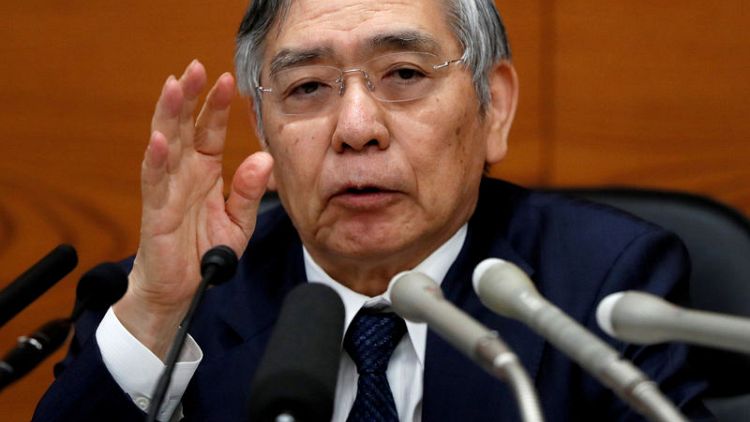By Stanley White
TOKYO (Reuters) - Japan's government has kicked off debate on changing antitrust rules to make it easier for regional banks to merge, as they struggle to generate profits due a declining population and a limited number of corporate borrowers.
In a meeting of a government advisory panel discussing Japan's growth strategy, Prime Minister Shinzo Abe instructed his ministers to come up with ways to smoothen regional bank consolidation that could include a revision of legislation or exemptions to existing regulations.
"Regional banks are facing a difficult business environment, which could affect borrowers and companies supported by the banks," Economy Minister Toshimitsu Motegi told a news conference after the meeting on Tuesday.
The panel is scheduled to finalise a plan in coming months.
The plight of regional banks has become a headache for the BOJ, which is drawing criticism for hurting financial institutions' profits by keeping interest rates virtually at zero for years.
BOJ Governor Haruhiko Kuroda said on Monday raising rates alone won't solve structural problems regional banks face, such as a dwindling population and a lack of funding demand, and that mergers and consolidation could be options for them to survive.
"Many banks are losing money on their deposit and lending business," said Ryoji Yoshizawa, financial sector analyst at Standard & Poor's Ratings Japan.
"Consolidation is not simply necessary. It is unavoidable for regional banks to become more efficient."
One problem advisers will consider is what they say is a lengthy process to approve bank mergers, according to documents published by the advisory panel.
It took two years and two months for regulators to approve a merger between Shinwa Bank and Eighteenth Bank <8396.T>.
The Fair Trade Commission initially blocked the deal over concerns the newly-created bank would control about 70 percent of the lending market in the southern prefecture of Nagasaki.
However, the Financial Services Agency (FSA), the country's banking regulator, pushed for consolidation to help banks survive a shrinking population.
One option is to revise antitrust laws so they could be applied more flexibly to regional banks, a government bureaucrat told reporters, which could allow mergers like the one between Shinwa Bank and Eighteenth Bank to proceed more quickly.
As of March, 52 out of 106 regional banks have reported losses in the past two years or more on their lending business, according to the FSA, highlighting the struggle to turn a profit outside Japan's major cities.
Around 50 percent of Japanese companies rely on regional banks as their main source of borrowing, documents published by the panel showed, which shows the risk companies face if a regional bank failed.
The BOJ has taken steps to ease the strain on banks, such as its decision in July to reduce the amount of commercial bank reserves subject to its negative 0.1 percent interest rate.
(Reporting by Stanley White and Taiga Uranaka; Editing by Kim Coghill)



